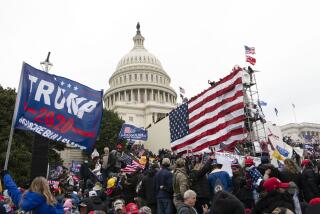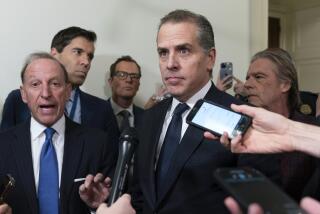Poindexter Immunity Is Agreed On : First Testimony to Be Given in Secret, at Walsh’s Request
- Share via
WASHINGTON — Iran- contra prosecutor Lawrence E. Walsh reached agreement with congressional investigators Tuesday to allow former White House National Security Adviser John M. Poindexter to testify in secret about the scandal by mid-May under a limited grant of immunity from prosecution.
The committees agreed with Walsh not to interview Poindexter publicly until mid-June.
The plan, which is expected to be approved formally today by members of the House and Senate select committees investigating the scandal, is designed to give Walsh time to develop an independent criminal case against Poindexter before the committees hear from him.
‘Acceptable to All’
“It’s acceptable to all parties,” said a House committee spokesman.
If Poindexter testifies under a grant of immunity, Walsh may not use information from that testimony as part of a criminal case against him. He is trying to delay Poindexter’s testimony as long as possible to give himself more time to develop his case.
But while Walsh’s goal is prosecutions, the House and Senate committees are seeking to bring information about the Iran-contra scandal--specifically about President Reagan’s involvement--to light as quickly as possible. They are moving to grant immunity to Poindexter as a means of forcing him to testify about his role in the affair for the first time.
Poindexter has declined to testify, invoking the Fifth Amendment protection against self-incrimination. Under a grant of immunity, Poindexter would lose that constitutional protection and face contempt of Congress charges if he refused to testify.
Not Full 90 Days
Tuesday’s agreement, worked out in a meeting between attorneys for Walsh and the committees, does not quite give Walsh the 90-day delay he sought in the grant of immunity to Poindexter. While the committees agreed not to interview Poindexter publicly for 90 days, they insisted on taking a private deposition after 60 days.
Legal experts on the congressional committees assured Walsh’s staff that a criminal case against Poindexter could not be jeopardized by information he provides privately to the committees in May as long as the prosecutor is not informed of it. Leaks in the press of Poindexter’s private testimony, however, could jeopardize Walsh’s case.
Although Walsh also sought a pledge that the committees would not grant immunity to former White House aide Oliver L. North within 90 days, neither panel has any intention of immunizing North in the near future. Thus the agreement does not mention North.
The committees have decided to proceed with Poindexter’s testimony before immunizing North because they believe that Poindexter is more likely to know whether President Reagan was informed of the diversion of profits from secret Iranian arms deals to Nicaraguan rebels.
Vote Expected Wednesday
The House and Senate investigating committees, which so far have granted immunity to four witnesses, also are expected to vote today to immunize five more persons--none of them major participants in the affair of the stature of Poindexter and North.
In addition, according to a source, the Senate committee is likely to vote to hold retired Maj. Gen. Richard V. Secord in contempt for failing to respond to a subpoena of records from bank accounts believed used in the Iran-contra transactions. The full Senate would then have to decide whether to hold Secord in contempt.
Secord has claimed the constitutional protection against self-incrimination in withholding the accounts.
Even as lawyers for Walsh and the congressional investigating committees agreed on a timetable for granting immunity to Poindexter, the former national security adviser again cited his Fifth Amendment privilege and refused to answer a House committee’s questions about a 1986 order on computer security.
Fourth Use of Protections
It was the fourth time since December that the former presidential adviser has invoked constitutional protections against self-incrimination to escape testimony.
In a brief appearance before the House Government Operations Committee, Poindexter four times declined to answer questions from Chairman Jack Brooks (D-Tex.) about the presidential directive, which ordered new safeguards on computers and phone networks carrying sensitive data.
The committee had subpoenaed Poindexter Feb. 25 after he declined to testify voluntarily, despite assurances that the committee would not touch on the Iran affair. His refusal to testify Tuesday drew pointed criticism from several lawmakers.
Rep. Barney Frank (D-Mass.) accused Poindexter and his attorney, Richard Beckler, of using the constitutional guarantee “as a blanket refusal to participate in a hearing” of any kind, whether related to Iran or not.
“His doing so is a perversion of the spirit of the (Fifth) Amendment,” Frank said.
Attorney Accuses Panel
An equally angry Beckler accused the House panel of exploiting his client, in the style of the late Sen. Joseph R. McCarthy, by creating “the public spectacle of yet another hearing in which our client would be forced to invoke his constitutional rights before a sea of cameras and microphones.”
The committee insisted on questioning Poindexter, he said, despite ample notice that he would refuse to testify and the White House offer of other officials who could answer the panel’s questions.
While the House panel’s inquiry into computer security does not deal directly with the Iran-contra affair, Beckler said, it would be “extremely ill-advised for us to take anything but the broadest view” of requests for testimony, lest that testimony set a precedent.
Poindexter, Beckler said, “is not prepared to testify before any committee at this time.”
More to Read
Get the L.A. Times Politics newsletter
Deeply reported insights into legislation, politics and policy from Sacramento, Washington and beyond. In your inbox twice per week.
You may occasionally receive promotional content from the Los Angeles Times.










